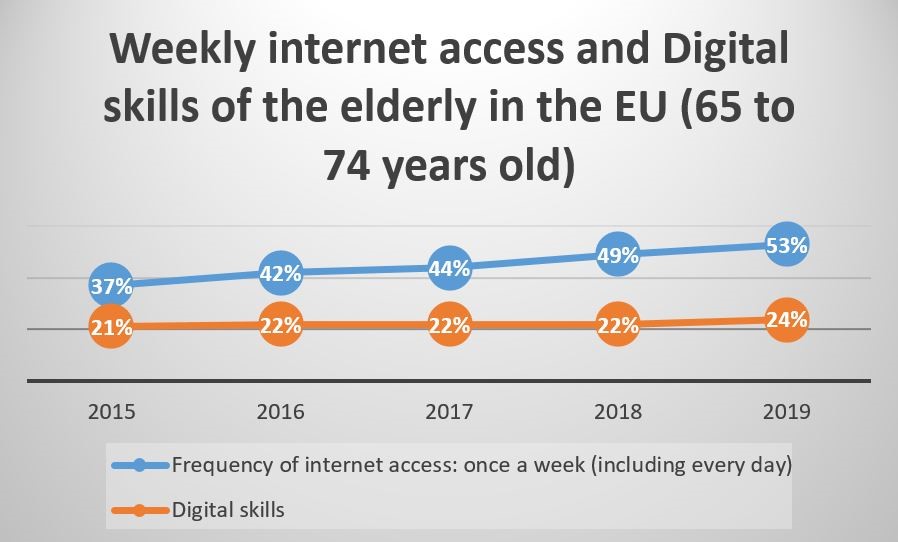
Digitalizing the Golden Agers
According to Eurostat (2021a), the percentage of elder people (65 to 74 years old) accessing the internet at least once a week increased by 128% during the last decade. Today (2020), 57% of them has weekly contact with the online world. At the same time, according to data of the same statistical authority (Eurostat, 2021b), only 24% of the elderly are equipped with at least basic digital skills. Therefore, there is a large percentage of seniors who access the internet but they might not have the necessary safety skills in front of online threats and frauds.
The European Crime Prevention Network (EUCPN) addresses that “the Internet is a perfect medium for organised crime”. The elderly, despite their low adoption rate in technologies, is a usual target for online fraudsters and scammers because they are considered more vulnerable (EUCPN, 2017). In fact, a recent international survey on cyber safety revealed that almost 500 million consumers have been victimized by cyber-crime in ten countries. Moreover, 43% of them have lost money because of the cybercrime committed. Elder consumers, given the lower extend of familiarity with digital devices and the internet in general, are understandably concerned about security and safety issues (The Harris Poll, 2020).

The E-Commerce sector is literally booming worldwide with b2c sales reaching as far as almost $5 trillion today (Statista, 2020). Retailers and consumers are obliged to provide personal and payment details through the web to initiate the sale. This attracts numerous cybercriminals to exploit security gaps and invade both parties. Payment card frauds, e-skimming, phishing, computer worms, botnet are only some of the existing threats on the internet. Unfortunately, public intervention usually comes next when hackers and online thieves strike.
The e-Protect project was born to target this need and act preventively on cybercrime among the elderly. The main aim of this EU funded project is to educate EU citizens and the elderly on how to access and engage in online activities by experiencing a high level of consumer and personal data protection. For this reason, the partnership developed a Competency Scale to inform individuals and practitioners in education and training, about the required skills to safely navigate to the internet.
According to the main findings presented in the research report, along with the professional frameworks around these areas “The Digital Competence Framework for Consumers” of the European Commission, the Competency Scale includes ten areas of competence divided into three main categories:
- Consumer behaviour and protection,
- Online payments and transactions,
- Data protection and privacy.
This Competency Scale consists of an innovative tool for measuring the competence of individuals in online safety. At the same time, the scale can inform trainers to develop educational material and activities for application during their practice. All the information about the project, including the Competency Scale and upcoming lesson plans and activities, are already available on the project website. The e-protect partnership is actively working on producing more interesting features for strengthening the elderly’s competence in online safety and increasing educators’ capacity building and professionalization on training elderly people.
Follow us on Facebook: @eProtectprojectEU
Read the full article here.


